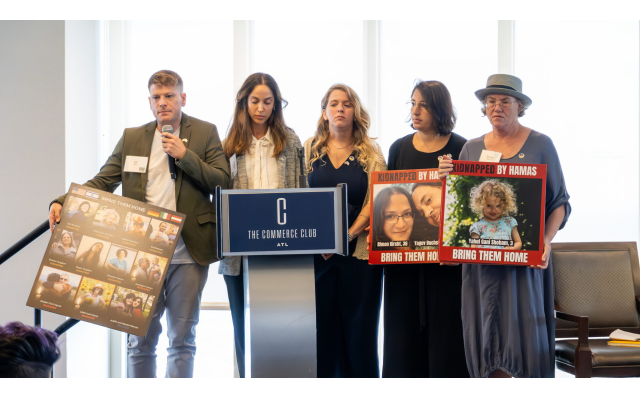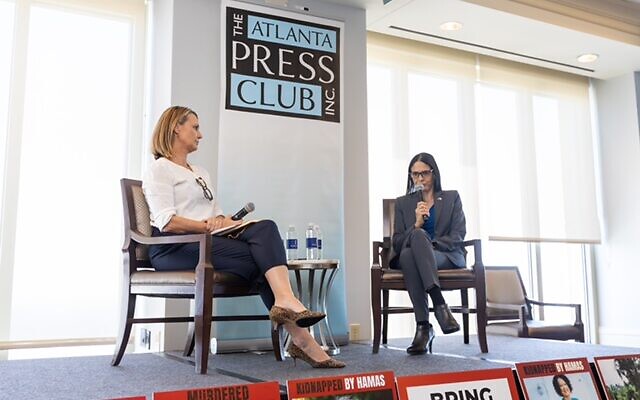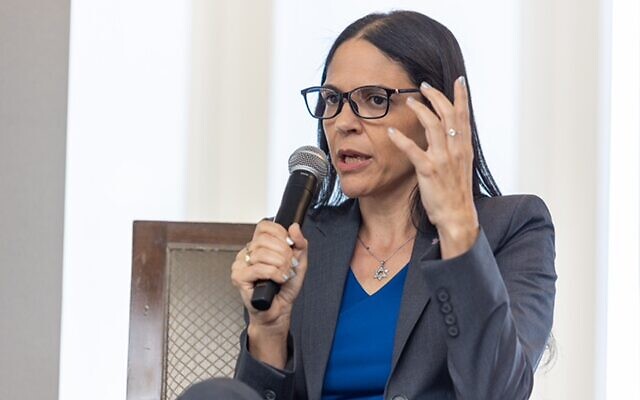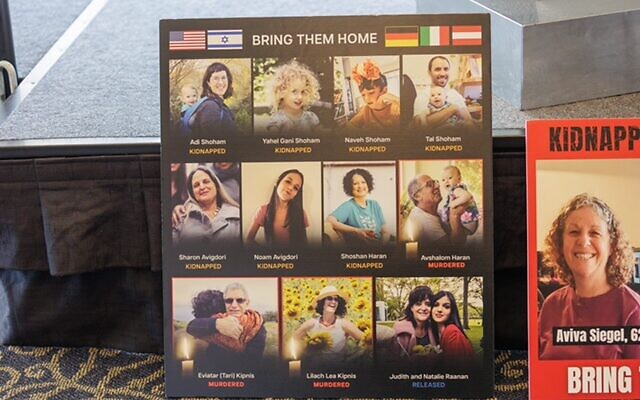Israeli Diplomat’s Blunt Words on War with Hamas
"Israel cannot afford to base its policies and decisions and our survival on a popularity contest," consul general says.
Dave Schechter is a veteran journalist whose career includes writing and producing reports from Israel and elsewhere in the Middle East.

Israel’s Consul General to the Southeast Anat Sultan-Dadon minced no words when she spoke Oct. 30 at the Atlanta Press Club.
“We are currently in one of the hardest points in time for the State of Israel and for the Jewish people,” she said.
The ranking Israeli diplomat in a seven-state region said, “We do think it is a moral imperative to stand with Israel today, because standing with Israel today is standing with humanity.”
Placed in front of the platform where Sultan-Dadon was interviewed by former CNN anchor Robyn Curnow were posters with pictures of some of the estimated 240 Israelis kidnapped by Hamas on Oct. 7. Representatives of three hostage families spoke briefly at the end of the program, in advance of their appearance the evening of Oct. 30 at a Jewish community vigil, held at the Ahavath Achim Synagogue.

Sultan-Dadon rebuked anti-Israel protestors, particularly those chanting approval of the Hamas attacks, in which 1,400 Israelis were murdered, many by means so horrific that days were required to identify the bodies.
“For those terrorists, this is not about a political goal. Their goal is genocidal,” she said. “There are people who are demonstrating in the streets, cheering the massacre of babies, of children. There are people chanting for the elimination of the State of Israel. This should be unsettling for the Jews. This should be unsettling for society as a whole. It cannot be that this is tolerated.”
A 43-minute compilation of the cruelty inflicted by Hamas on many of the children, women, and men killed on Oct. 7 was shown Oct. 23 to international journalists, some of whom wrote of their inability to watch the full video.
“I think that we cannot afford to look away. The images are horrific, but our reality is horrific. Humankind cannot afford to look away when such atrocities are being committed,” Sultan-Dadon said. “Our most urgent priority, our duty as a sovereign country, our duty to our citizens is to work that we will ensure that we will never see such images again.”
Much of the world may oppose the scope of Israel’s retaliation but, “Israel cannot afford to base its policies and decisions and our survival on a popularity contest. Our survival is at stake, and we have a duty to do that, whatever it takes, to ensure our survival,” the consul general said.
“Israel has been clear in saying that it is preparing for a prolonged military response. We don’t have a time frame on this. The time frame will be determined by whether or not the terror threat has been eliminated and we cannot allow ourselves to stop before we put an end to the terror threat,” she said.
Even as Israel continues to strike targets in Gaza from the air and an increasing number of ground troops and armor move into Gaza, Sultan-Dadon placed blame for the Palestinian death toll and the resulting humanitarian crisis on Hamas.

“Outrage should be directed at all who support Hamas and all who support terror,” she said. “We have no interest in harming civilians. We have no interest in harming Palestinian civilians. This is the price that Hamas has chosen for their people and, unfortunately, yes, while we do everything to minimize harm to civilians, Hamas is intentionally placing them in harm’s way.”
On one aspect of that crisis, Sultan-Dadon said, “Hamas is sitting on stockpiles of fuel. Rather than prioritize that fuel to go towards the desalination plants in Gaza, which provide 90 percent of the water in Gaza, Hamas is prioritizing its fuel not for water . . . [but] for their war machine.”
Asked what victory in Gaza would look like, Sultan-Dadon replied, “That there is no terror threat to our children in Israel coming from the Gaza strip. Knowing that our children can sleep safe at night in their beds and homes, free from the constant barrage of rockets fired at them . . . We need to make sure that the end result allows for this never to happen again.”
We have no interest in harming civilians. We have no interest in harming Palestinian civilians. This is the price that Hamas has chosen for their people and, unfortunately, yes, while we do everything to minimize harm to civilians, Hamas is intentionally placing them in harm’s way.
More broadly, she said, “There is a much bigger picture here. Hamas would not have been able to commit the heinous terror attack on Oct. 7 were it not for the support, the training, the funding, the guidance of Iran . . . The Iranian threat is not just the threat to Israel. It is a global threat and one that must be addressed.”
Among the motivations discussed for the Hamas attacks, which included firing several thousand rockets into Israel, is an effort to scuttle expansion of Israeli ties with other Arab nations, as exemplified in the Abraham Accords.
“We have seen the circle of peace growing in our region and we are seeing more and more leaders make a decision to choose a better future for their people,” Sultan-Dadon said, mentioning in particular Saudi Arabia. “The terrorists want to see a future of destruction in Israel and in the Middle East. I think that, ultimately, leadership that chooses peace and a bright future for their people, I think that will prevail. We need to give it time and we need to allow for the dust to settle. Where there are common interests and mutual benefits, I think we will see more relations being forged.”

She decried what she described as a lack of leadership in some quarters, including by university presidents “who hide behind what they think is remaining objective by avoiding taking sides.”
“The only two sides here are standing with humanity or standing with those who glorify death and destruction. Those are the only two sides here. This is not about pro-Israel or pro-Palestinian,” Sultan-Dadon said.
“Leaders – political leaders, academic leaders, faith leaders, community leaders – they all have a responsibility to use their voice right now in this very, very dangerous climate. They have to take a moral stand. It cannot be that we will look for more and more ways to shield ourselves, for more and more ways to hide how not to show if one is Jewish or Israeli, how to be better protected, how to add more and more layers. What is wrong with societies if that’s where we find ourselves?” she asked.



comments